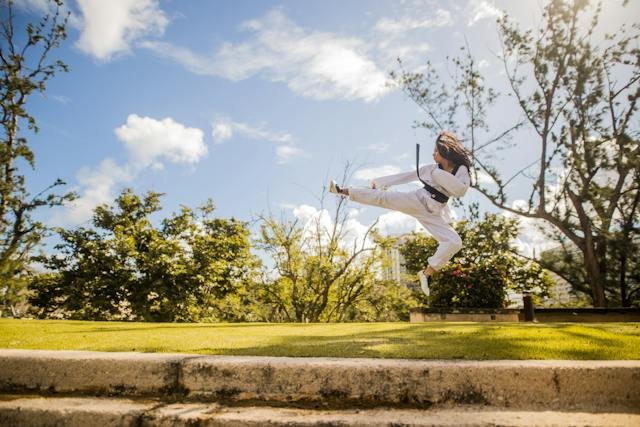The world of martial arts is not just about physical prowess and discipline; it is also deeply intertwined with the rich linguistic and cultural heritage from which these arts originate. For students of Kung Fu, especially those with a keen interest in immersing themselves fully in its tradition, understanding the Mandarin language is an invaluable part of their journey. This article serves as a primer, introducing key Mandarin terms that every Kung Fu apprentice should know, thereby deepening their appreciation and understanding of this ancient art.
Kung Fu (功夫 – Gōngfu)
The most universally recognized term, Kung Fu is a general term that refers to Chinese martial arts. However, its literal translation, “skill achieved through hard work,” highlights a philosophy that success in any field requires dedication and effort.
Sifu (师傅 – Shīfu)
In Kung Fu, your teacher or master is referred to as “Sifu.” This title is a marker of skill and respect and the deep mentor-student relationship in Chinese martial culture. Sifu is someone who guides you not only in military techniques but also in moral and philosophical teachings.
Wushu (武术 – Wǔshù)
Wushu is often used interchangeably with Kung Fu in the West, but it specifically refers to the sport and exhibition aspect of Chinese martial arts. It emphasizes graceful movements and acrobatics alongside martial techniques.
Qi (气 – Qì)
A central Chinese philosophy and medicine concept, Qi, often translated as “life energy,” is pivotal in Kung Fu. Understanding and harnessing Qi is key to mastering martial skills and achieving higher awareness and health.
Taolu (套路 – Tàolù)
Taolu refers to the sequences or forms in Kung Fu, which are choreographed patterns of movements. These forms are essential for learning the art, as they help students practice techniques, develop fluidity, and understand the rhythm of movements.
Quan (拳 – Quán)
Quan, meaning “fist,” is often used in the names of various Kung Fu styles and techniques, such as “Taijiquan” (太极拳 – Tàijíquán, Tai Chi). It signifies the martial aspect and the use of the hands in combat.
Zhan Zhuang (站桩 – Zhàn Zhuāng)
This term refers to standing meditation, which is common in many kung fu styles. Zhan Zhuang, which means “standing like a post,” is a practice for developing internal strength, balance, and a deep sense of grounding.
Leitai (擂台 – Lèitái)
Leitai refers to a raised platform where martial arts matches are held. Historically, it was the stage for martial arts challenges and competitions, where fighters tested their skills against each other.
Gong Li (功力 – Gōnglì)
This term refers to the level of skill or power one has achieved in Kung Fu. It encompasses physical strength, technique, speed, accuracy, and understanding of Qi.
Table of Contents
ToggleConclusion
For the Kung Fu apprentice, these Mandarin terms are more than mere words; they are a gateway into the philosophy, technique, and history of the martial art. Understanding and using these terms is a way of honoring the cultural roots of Kung Fu and enriching one’s practice. As one embarks on the journey of martial arts mastery, intertwining language, and movement, they don’t just learn to fight – they embrace a whole new way of seeing and interacting with the world.
FAQs
What is the difference between Kung Fu (Gōngfu) and Wushu (Wǔshù)?
Kung Fu (功夫 – Gōngfu) is a general Chinese martial arts term emphasizing discipline and hard work. Wushu (武术 – Wǔshù) refers explicitly to the sport and exhibition side of Chinese martial arts, focusing on grace and acrobatics.
Is Sifu (Shīfu) or Shifu (Shīfù) the correct term for a Kung Fu teacher?
Both Sifu (师傅 – Shīfu) and Shifu (师父 – Shīfù) are correct but have different nuances. Sifu commonly refers to a martial arts teacher, while Shifu implies a deeper, more parental relationship.
Can someone proficient in Kung Fu not understand Mandarin?
Yes, it’s possible to be proficient in Kung Fu’s physical aspects without knowledge of Mandarin. However, understanding Mandarin enriches the practice by deepening the understanding of its philosophy and history.
Is learning Mandarin essential for Kung Fu training?
Learning Mandarin is optional for physical training but enhances understanding of Kung Fu’s cultural and philosophical dimensions.
Does Kung Fu involve only physical training?
Kung Fu encompasses physical and mental aspects, including physical techniques, mental discipline, philosophical teachings, and Qi cultivation in many styles.
Contact our head teacher, Chen Huimin, at info@lcchineseschool.com if you want to learn Chinese or have additional questions about our Chinese programs.
Sign up for a free trial class here.
Learn about our Internship Program in China.
Get free Chinese learning resources.
Learn about China’s 2024 Offical Holiday Schedule








